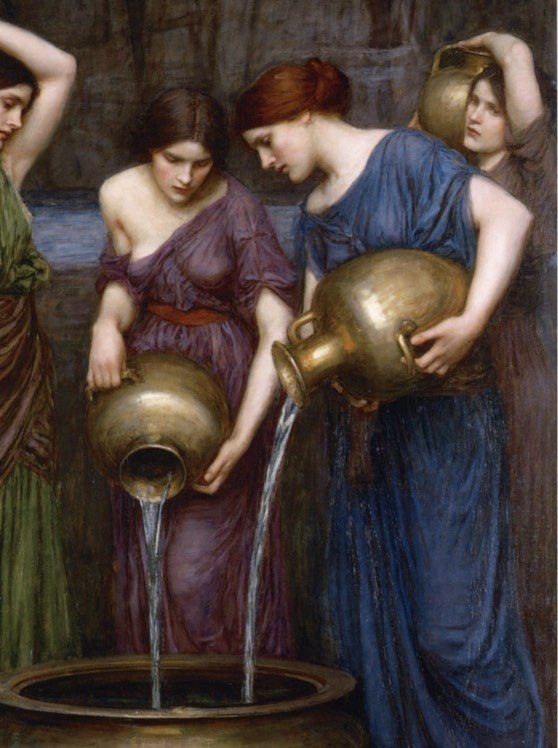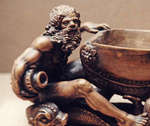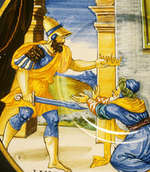
The Danaids
The Danaids – or the Danaides; also called Belides after their grandfather – were the fifty daughters of Danaus, one of the two twin sons of king Belus of Egypt and the Naiad Anchinoe. Danaus’ brother Aegyptus had fifty children as well; in his case, all of them were male. In an attempt to expand his territory without a war, Aegyptus tried forcing Danaus to marry all of his fifty daughters to his sons. Aided by Athena, Danaus built the first ship in history and smuggled the Danaids to Argos. Even though, after some hesitation, the Argive king Pelasgus agreed to protect his guests, in due course, Aegyptus’ sons arrived in Argos and immediately made their demands pretty clear: either they should get the Danaids willingly, or they would take both them and the Argive throne by force. Not wishing to cause any more problems, Danaus saw no other option but to give in. Or did he?
The Twin Brothers
Danaus and Aegyptus
King Belus of Egypt and the Naiad Anchinoe – sometimes also called Achiroe – had at least two children: the twin brothers Danaus and Aegyptus. A ruler of a vast empire, Belus could afford to hand over to one of his sons, Aegyptus, the whole of Arabia, and to the other, Danaus, the country of Lybia. The twin brothers ruled justly with each of their kingdoms for some time; during this period, each of them fathered, by numerous wives, fifty children. Aegyptus’ children happened to be all boys; Danaus’, on the other hand, were all girls: the Danaids.
Aegyptus’ Offer
Between the two twins, Aegyptus seemed like the more restless one. Early on, he conquered the tribe of the Melampodes (that is, the Black Feet) and expanded the boundaries of his kingdom so much that eventually, he could name the land of Egypt after himself. So, it is difficult to blame Danaus for being a bit suspicious when Aegyptus offered his fifty sons in marriage to Danaus’ fifty daughters; in the eyes of Danaus, this was merely a ploy by which Aegyptus planned to soon take over Lybia as well.
The Escape
Sailing Away to Argos
Afraid both for his own life and for the wellbeing of his daughters, Danaus quickly set his mind on devising an escape plan. He was at his wit’s end when, fortunately, the goddess Athena came to his aid. She instructed him how to build a large ship (supposedly, the first one ever built) and advised Danaus to sail away to Argos, the birthplace of his great-great-grandmother Io, the ancestress of all Argive kings and heroes. On his journey there, as a token of his gratitude, Danaus built and dedicated a temple to Athene on the island of Rhodes, at Lindos.
In Argos
As soon as Danaus and his daughters reached Argos, they immediately entreated the protection of the then-Argive king Pelasgus. At first, Pelasgus was a bit reluctant, not wishing to stir up any trouble with the mighty Aegyptus. However, urged by the pleas of his people, and encouraged by Danaus’ royal line of descent, he ultimately agreed to give the Danaids shelter within the walls of his kingdom.
The Marriage
A Bloodstained Wedding Night
Aegyptus wasn’t at all impressed with Pelasgus’ decision. So, not long after he and his sons disembarked on Argive soil, he threatened to start a war with Pelasgus – that is unless Danaus agrees to give the Danaids in marriage to his sons. Danaus did the right thing: he agreed to the marriages and even prepared a great feast to celebrate the occasion. However, he secretly gave each of his fifty daughters a dagger and an order to murder their husbands on the wedding night. Forty-nine of them obeyed: as soon as they fell asleep, they chopped the heads of forty-nine of Aegyptus’ sons and presented them to Danaus the next morning as evidence of their obedience.
Hypermestra
However, the eldest Danaid, Hypermestra, didn’t kill her husband, Lynceus. Some say it was because she instantly fell in love with him, others because he was gentle and respected her desire to remain a virgin. Either way, Hypermestra revealed Danaus’ plan to Lynceus and begged him to leave Argos before it was too late. He did: during the night, Lynceus escaped to the nearby town of Lyrceia, where he lit a beacon to let Hypermestra know that he was safe. Danaus punished Hypermestra’s defiance by imprisoning her and putting her on trial. However, the Argive court acquitted the eldest Danaid of any wrongdoing. Then again, everything else would have been nothing short of a blasphemy: Aphrodite herself appeared during the trial to testify on Hypermestra’s behalf. She did it out of love, the goddess said, and men should never punish love.
The Outcome
Running for Your Wife
Now that his daughters had killed their husbands, Danaus had the task of finding them new ones. And even though the Danaids had been purified of their murders by Hermes and Athena, it is not like the young men of Argos rushed to marry the Danaids – not after having seen what happened to the sons of Aegyptus. So, Danaus agreed to give away each of his daughters without requiring any dowry or bridal gifts. Suddenly, many had changed their minds; in fact, too many. In order to be fair to their wishes, Danaus made the suitors run a race: the winner of the race would be the one to pick his wife first, the second one second, and so on. In the end, all but two of Danaus’ daughters remarried.
Poseidon and Amymone
You see, during the preparations for the race, it so happened that Poseidon dried up all of the springs at Argos; apparently, he had been still angry at Inachus for testifying that Argos belongs to Athena. So, Danaus sent his daughters to draw water from the nearby places. Amymone – one of the younger Danaids – happened upon a sleeping satyr and woke him up; the satyr immediately tried to force himself upon her. Fortunately, Poseidon appeared and rescued Amymone from the shameless creature. The god of the sea fell in love with Amymone instantly and made her his wife; as gratitude, he also revealed to her the springs at Lerna.
Lynceus and Hypermestra
The second Danaid not to be given away to one of the participants in Danaus’ footrace was, of course, Hypermestra. Deeply in love with Lynceus, she had sworn on her virginity to wait for him until Danaus agreed that she could have him back. Some say that Lynceus reconciled with his father-in-law once that happened; others that he avenged his brothers’ death by killing Danaus. Either way, all agree that Lynceus and Hypermestra had a long and happy marriage. In time, Hypermestra gave birth to a son named Abas who married Ocalea and had with her three sons. One of them was none other than Acrisius, the grandfather of Perseus.
The Danaids in the Underworld
It seems that Amymone and Hypermestra were the only two Danaids spared from a terrible sentence in the afterlife. It is said that as soon as the forty-eight murdering wives died, they were all punished for having broken their marriage vows in the depths of the Underworld, perhaps even in Tartarus. The punishment consisted of this: so as to wash their sins away, the Danaids were supposed to bathe themselves in a tub; of course, they had to fill it with water first. The catch? The tub, and all of their vessels, had leaks in them, and, so, none could ever be filled. Talking about futility.
The Danaids Sources
We know that Aeschylus, the father of tragedy, authored a trilogy documenting the events recounted above. Unfortunately, only one of these three plays has reached us: The Suppliants tells the story up to the arrival of the sons of Aegyptus in Argos. The rest of the story – and, most famously, Hypermestra’s heroic act – is told in a beautiful ode by Horace and in Apollodorus’ Library. Near the end of Pindar’s “Ninth Pythian Ode,” you can find a few verses evoking the matrimonial foot-race organized by Danaus after all but one of his daughters became widows overnight.
The Danaids Video
Link/Cite The Danaids Page
Written by: The Editors of GreekMythology.com. GreekMythology.com editors write, review and revise subject areas in which they have extensive knowledge based on their working experience or advanced studies.
For MLA style citation use: GreekMythology.com, The Editors of Website. "The Danaids". GreekMythology.com Website, 20 Nov. 2018, https://www.greekmythology.com/Myths/The_Myths/The_Danaids/the_danaids.html. Accessed 25 April 2024.




